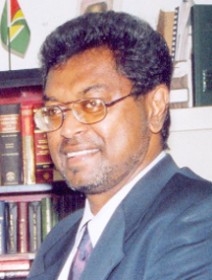-opposition bemoans ‘sham’ consultation
Government yesterday used its majority in the National Assembly to pass the contentious Court of Appeal (Amendment) Bill, which had triggered concerns within the legal fraternity because of the power of appeal it extends to the Director of Public Prosecution (DPP) in criminal matters.

The controversial legislation provides for appeals by the state through the DPP to as far as the Caribbean Court of Justice; a provision which parliamentary opposition parties have condemned as a new form of life imprisonment for persons seeking justice within a reasonable time. The Guyana Association of Women Lawyers (GAWL) had also joined in the discussions on the bill and had aired concerns about its content.
Consensus was never reached on the bill though it went to a Select Committee and was sitting there for a considerable period of time. The opposition, unified in its objection to the bill, charged yesterday that the committee process was a “sham,” which excluded any recommendations from voices outside of the government and disregarded “public submissions.” The opposition called for the bill to be recommitted to the select committee saying the deliberations never got off the ground. AFC Chairman Khemraj Ramjattan said he never attended a single meeting of the select committee because the process was a “fraud from the beginning” and according to him government MP Moses Nagamootoo also had cause to walk out of a meeting.
But government viewed the bill as necessary since it was initially debated back in 2008 and its position remained the same prior to its passage yesterday. Attorney General Charles Ramson successfully moved to have the Report of the Select Committee adopted and the bill was passed subsequently.
Government speakers were disinclined to respond to criticisms from the opposition benches that the select committee was an illusionary, democratic process. PPP/C MP Priya Manickchand said every individual view and/or submission could not have been taken on board, adding that the “majority rules in a democracy.” She said the government is likely to be criticised as being unreasonable once the opposition view is not implemented.
But PNCR 1G MP Clarrisa Riehl said the process was simply unreasonable. She cited the nine meetings of the select committee, saying the government used the one opportunity when opposition members were absent due to other parliamentary commitments to rush the bill through. She quoted from the minutes of the eighth meeting of the committee which referred to comments the Attorney General said on that occasion. “…since there was no viable suggestion on the amendment of the bill, both in the National Assembly and at the Committee level,” he saw the need “to speedily pursue its completion,” Riehl quoted from the report. She argued that there was no consultation with the opposition “period” and questioned why such an approach was taken. She said too that the public deserved a right to be heard, noting that even the submissions from the public were ignored.
PPP/C MP Bibi Shadick contended that the opposition sought to turn the select committee process into a parliamentary debate. “They wanted to argue the same points they raised in Parliament and we could not allow that,” Shadick said, noting that the line had to have been drawn somewhere. She said submissions were taken on board and cited presentations they received from the DPP and members of the GAWL and according to her, the DPP was even calling for greater powers, but was not entertained.
Shadick frankly stated that many of the submissions lacked substance. “We could not have gotten anything from them,” she argued. She also responded to the criticism that the final meeting was brief and was hurried to exclude the opposition, saying that if that was then “so be it.”
PNCR-1G MP Basil Williams reiterated that the select committee process was a sham and according to him, it called into question the purpose of such committees. He questioned what the point of the committees is when the main opposition party in parliament cannot even contribute. Williams said the situation is worrying because the justice system in this country is dysfunctional.
He said the final meeting of the committee lasted a mere eleven minutes, noting that when the opposition members walked in it was over and a decision was already made to have the report submitted to Parliament. “Nothing can really move forward in this country like this,” he charged.
The bill envisages conferring the right of appeal to the DPP for the following offences: Murder, treason, manslaughter, rape, defilement and other sexual offences, piracy, hijacking, money laundering, robbery, drug offences, burglary, housebreaking, theft, offences involving dishonesty, firearms offences, conspiracies and attempts to commit listed offences and aiding and abetting such persons. The grounds of appeal would arise in cases where there was a material irregularity in the trial, there was substantial misdirection of the jury, a decision by the judge to exclude material evidence that the prosecution sought to present and where the sentence is wrong in principle, among other areas.





